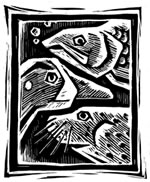- Home
- Restoration Projects
- Project Search
- Pink Salmon Egg to Pre-Emergent Fry Survival in PWS 93003
Project Information
Title: Pink Salmon Egg to Pre-Emergent Fry Survival in PWS 93003
Project Year and Number: 1993: 93003
Other Fiscal Years and Numbers for this Project: 1999: 99191-A-CLO, 1998: 98191-A1, 1997: 97191-A, 1997: 97191-A2, 1997: 97191-A1, 1996: 96191-B, 1996: 96191-A, 1996: 96191-A1, 1995: 95191-A, 1995: 95191, 1995: 95191-B, 1995: 95191-A1, 1995: 95191-A2, 1994: 94191-1, 1994: 94191-2, 1992: FS02, 1991: FS02, 1990: FS02, 1989: FS02
Principal Investigator (PI): Samuel Sharr (Alaska Department of Fish & Game)
Managing Agency: ADFG
Assisting Personnel: Brian Bue, Andrew Craig, Gary Miller, Jim Seeb
Research Location: Prince William Sound
Restoration Category: Research
Injured Resources Addressed: Pink Salmon
Abstract: Field evidence collected during the Natural Resource Damage Assessment (NRDA) of the March 1989 EVOS detected elevated mortalities in pink salmon eggs/embryos with indications of possible genetic damage as a result of exposure to oil during early developmental life stages. The purpose of this study is to monitor the recovery of pink salmon eggs and fry in the field, provide laboratory verifications of the field results, and test the hypothesis that exposure of pink salmon to a polluted incubation habitat will result in the functional sterilization of these animals at sexual maturity. Increased egg mortalities in oiled streams were found during the 1991 survey. The 1991 adult returns were the progeny of the 1989 brood year, the group with the highest exposure to intra-gravel oil. By monitoring the injury to pink salmon eggs and pre-emergent fry (Component A), pink salmon gametes (Component B) from Prince William Sound (PWS), and mimicking long term exposure to oil in a laboratory in southeast Alaska (Component C), field observations and laboratory results may be combined to determine if egg mortalities in 1989 and 1990 were potentially caused by oiling in the environment, and whether elevated egg mortalities in oiled streams in 1991 were potentially caused by genetic damage to 1989 eggs.Proposal: View (107 KB)
Reports:
Final Report: View (790 KB)
Publications from this Project: None Available
